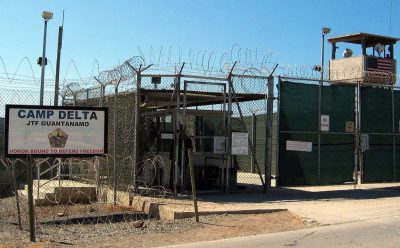
Protesters gathered Saturday afternoon on Park Street to support the shutdown of Guantánamo Bay and the return of the land to the Cuban people.
The rally, organized by United for Justice with Peace, was held the day after the 115th anniversary of the United States acquisition of the land through a required lease supported by the Platt Amendment following the Spanish-American War. The lease can only be voided via mutual agreement between the United States and Cuba.
Susan McLucas, member of the UJP, said before the rally that protesters are raising their voices to close Guantánamo Bay prison, saying prisoners there are unjustly held and tortured.
“Most of the prisoners at Guantánamo were simply plucked out of their ordinary lives because somebody wanted to get a bounty,” McLucas said in an interview. “So, you can imagine the frustration for being in jail for no good reason for 15 years and trying to not go crazy.”
Marilyn Levin, a member of the UJP Palestine Task Force, said during the rally that the U.S. control of the Guantánamo Bay is unnecessary and wasteful.
“Cuba is not a threat, and yet the U.S. keeps their land, threatens them and imposes sanctions and embargoes,” Levin said
Charles Welch, 67, of Brighton, said as a member of the July 26th Coalition, the organization had been demanding the United States give Guantánamo Bay to back to Cuba for years because holding it infringes upon Cuban sovereignty.
“Holding Guantánamo Bay is international terrorism,” Welch said in an interview during the rally. “It’s been 115 years of holding it against the will of the Cuban people. The United States has troops in Cuba and said they wouldn’t leave unless the Cubans signed the agreement, so they had no choice. The Cubans have been asking for it back ever since.”
The holding of Guantánamo Bay is a major issue to which more people should be paying attention, Welch said. If the tables were turned, he said, Americans would be infuriated.
“One of the things people never think of is think of what northern California would look like if San Francisco Harbor was controlled by someone else,” Welch said in the interview. “It would affect the whole economy of that area. The harbor isn’t available to Cubans, and it’s one of the greatest natural harbors in the world — it would be the second largest city of Cuba if the United States were never holding it.”
Because the United States holds control over Guantánamo Bay, Nalda Vigezzi, co–chair of the National Network of Cuba, said during the rally that Cubans are suffering from militarism, environmental pollution and the constant threat of invasion.
“Cuba needs to have their land back, to have their sovereignty and their commitment to living in a zone of peace with their Latin American neighbors,” Vigezzi said. “We call on everyone to step up the pressure to close [the] Guantánamo prison [and] return the sovereign area of Guantánamo Bay to the Cuban people.”
Nancy Murray, a previous education director at the American Civil Liberties Union of Massachusetts, said during the rally that President Donald Trump and past politicians have allowed for the continuation of detention and torture by branding it as the defense of freedom.
“President Trump has said torture works,” Murray said. “He’s wrong. Prison abuse like waterboarding, sleep deprivation, dog leashes [and] sexual humiliation all send us tumbling into the filth where our sworn enemies live, and it legitimizes [prisoners’] struggles in the eyes of [the politicians’] followers.”
In her concluding remarks, Murray said the Guantánamo Bay prison camp is a stain on U.S. history, and if the country wants to take a stand for human and international rights, it will shut the prison down.
“Guantánamo Bay serves as a symbol of torture, injustice and oppression,” Murray said. “The prison should be shattered. The rule of law should be restored, and we should adhere to our obligations to hold those responsible accountable.”
Agastyan Daram, 42, of Everett, said the prisoners of Guantánamo have the right to go through a fair judicial process and should at the very least have access to a court.
“These people are being held without trial basically,” Daram said in an interview. “We’re not saying they’re guilty or innocent. We don’t know and for the most part, many of them have been cleared for release. I think as human beings who live in a free country, we should be treating everyone with the same freedoms — to at least have their lawyer be able to speak for them [and] be able to go through a court system.”
Emily Hankle, 37, of Somerville, said she sees Guantánamo as a place that tortures and imprisons people without justice.
“My daughter’s first birthday is today so this is the second part of her birthday party,” Hankle said. “We had a party and now we’re to protest. I want to create a world where she feels like there is more justice.”




















































































































Tom Smith • Feb 26, 2018 at 11:01 am
Beyond what the article states, the U.S. leased Guantanamo for use as a coaling station and naval base in 1903 for $2,000 a year. In 1974, the yearly lease was set to $4,085. These lease amounts were fixed; not adjusted for inflation. In protest for the occupation, Cuba has never cashed the checks (except that one was accidentally cashed by Fidel Castro). The key points here are that the lease was for a coaling station and navel base, not a prison, and that a $4,085 yearly lease is well beyond insulting and exploitative.